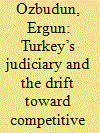| Srl | Item |
| 1 |
ID:
191059


|
|
|
|
|
| Summary/Abstract |
Prior research on Latin American and European populism has used the inclusionary and exclusionary distinction to differentiate between Left- and Right-wing populism. As Right-wing populists demand exclusion of immigrants and foreigners and Left-wing populists demand inclusion of the lower social class in the political landscape, the former is described as exclusionary and the latter as inclusionary. In this paper, I test this typology, comparing the populism of two political leaders in Pakistan across two different eras: Zulfiqar Ali Bhutto during 1967–77 and Imran Khan during 1996–2022. I argue that in the absence of an overarching liberal discourse, the inclusionary-exclusionary distinction has no meaning because populists of illiberal democracies can rely upon a greater ideological malleability, swinging between inclusionary to exclusionary politics in accordance with the demands of the moment.
|
|
|
|
|
|
|
|
|
|
|
|
|
|
|
|
| 2 |
ID:
139614


|
|
|
|
|
| Summary/Abstract |
Turkey has always been considered an “illiberal democracy”, or in Freedom House’s terms, a “partly-free” country. In recent years, however, there has been a downward trend toward “competitive authoritarianism”. Such regimes are competitive in that opposition parties use democratic institutions to contest seriously for power, but they are not democratic because the playing field is heavily skewed in favour of incumbents. One of the methods employed by competitive authoritarian leaders is the use of informal mechanisms of repression. This, in turn, requires a dependent and cooperative judiciary. Thus, in Turkey the year 2014 can be described as a period when the governing AKP (Justice and Development Party) made a sustained and systematic effort to establish its control over the judiciary by means of a series of laws of dubious constitutionality.
|
|
|
|
|
|
|
|
|
|
|
|
|
|
|
|